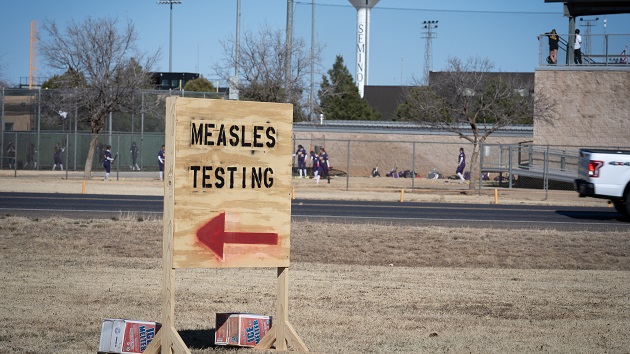
(NEW YORK) -- The U.S. has surpassed 1,000 measles cases for the first time in five years, according to new data from the Centers for Disease Control and Prevention (CDC) published Friday.
A total of 1,001 cases have been confirmed in 30 states including Alaska, Arkansas, California, Colorado, Florida, Georgia, Hawaii, Illinois, Indiana, Kansas, Kentucky, Louisiana, Maryland, Michigan, Minnesota, Missouri, Montana, New Jersey, New Mexico, New York, North Dakota, Ohio, Oklahoma, Pennsylvania, Rhode Island, Tennessee, Texas, Vermont, Virginia and Washington.
The last time the U.S. recorded more than 1,000 cases occurred in 2019, when there were 1,274 confirmed infections over the course of a year, CDC data shows.
The CDC says 13% of measles patients in the U.S. this year have been hospitalized, the majority of whom are under age 19.
Among the nationally confirmed cases, CDC says about 96% are among people who are unvaccinated or whose vaccination status is unknown.
Meanwhile, 2% of cases are among those who have received just one dose of the measles, mumps, rubella (MMR) vaccine and 2% of cases are among those who received the required two doses, according to the CDC.
In Texas, where an outbreak has been spreading in the western part of the state, at least 709 cases have been confirmed as of Friday, according to the Texas Department of State Health Services.
A total of 92 patients have been hospitalized over the course of the outbreak and at least two school-aged children have died. Both were unvaccinated and had no known underlying conditions, DSHS said.
A third measles death was recorded in New Mexico among an unvaccinated adult who tested positive after dying, according to the New Mexico Department of Health. At least 71 cases have been recorded in New Mexico, mostly in Lea County, which borders western Texas, department data shows.
In both Texas and New Mexico, most cases have occurred among those who are unvaccinated or with unknown vaccination status, mirroring national trends.
The CDC currently recommends that people receive two doses of the MMR vaccine, the first at ages 12 to 15 months and the second between 4 and 6 years old. One dose is 93% effective, and two doses are 97% effective against measles, the CDC says.
However, CDC data show vaccination rates have been lagging in recent years. During the 2023 to 2024 school year, 92.7% of kindergartners received the MMR vaccine, according to data. This is lower than the 93.1% seen the previous school year and the 95.2% seen in the 2019 to 2020 school year, prior to the COVID-19 pandemic.